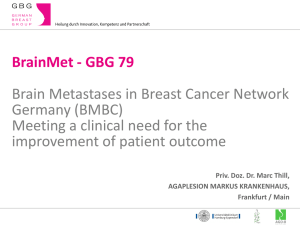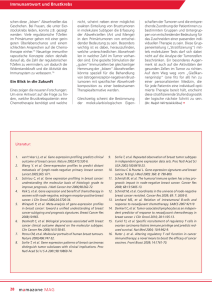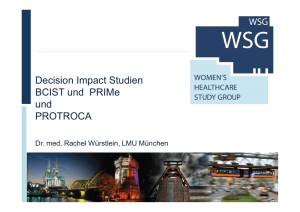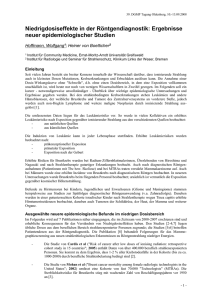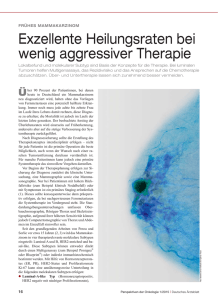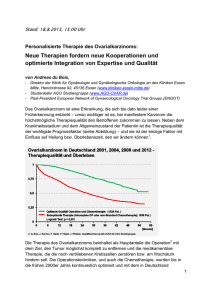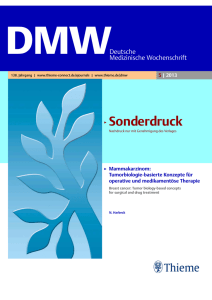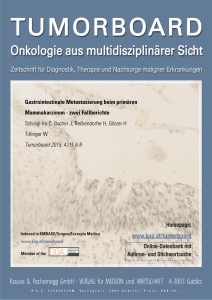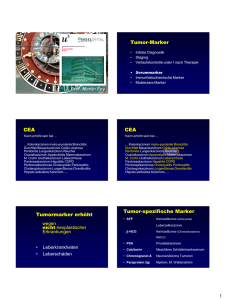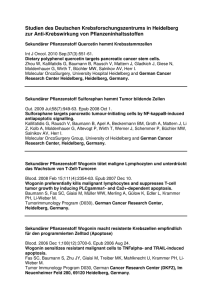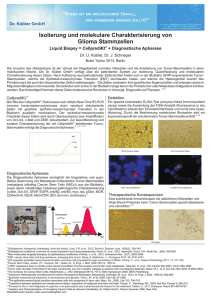Flyer Gyn/Mamma - 32. Deutscher Krebskongress 2016
Werbung
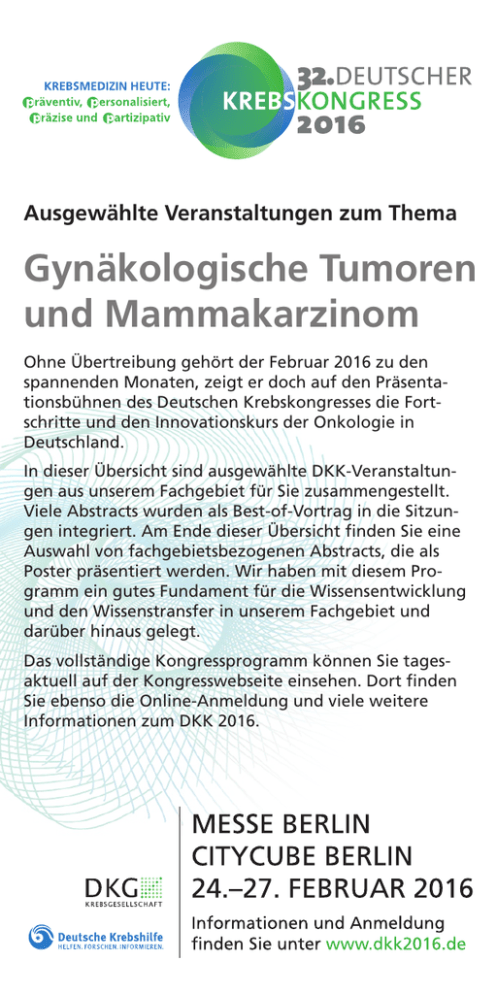
Ausgewählte Veranstaltungen zum Thema Gynäkologische Tumoren und Mammakarzinom Ohne Übertreibung gehört der Februar 2016 zu den spannenden Monaten, zeigt er doch auf den Präsentationsbühnen des Deutschen Krebskongresses die Fortschritte und den Innovationskurs der Onkologie in Deutschland. In dieser Übersicht sind ausgewählte DKK-Veranstaltungen aus unserem Fachgebiet für Sie zusammengestellt. Viele Abstracts wurden als Best-of-Vortrag in die Sitzungen integriert. Am Ende dieser Übersicht finden Sie eine Auswahl von fachgebietsbezogenen Abstracts, die als Poster präsentiert werden. Wir haben mit diesem Programm ein gutes Fundament für die Wissensentwicklung und den Wissenstransfer in unserem Fachgebiet und darüber hinaus gelegt. Das vollständige Kongressprogramm können Sie tages­ aktuell auf der Kongresswebseite einsehen. Dort finden Sie ebenso die Online-Anmeldung und viele weitere Informationen zum DKK 2016. Plenarsitzung PLENARSITZUNG Donnerstag, 25. Februar 2016 9:15 – 10:45 Plenar: Ovarialkarzinom Teil 1 Vorsitz: Hauptmann, S. (Düren); Schmalfeldt, B. (München) State of the Art: Qualitätssicherung beim Ovarialkarzinom in Deutschland | Hilpert, F. (Kiel) Spezifische Konzepte für Low-grade-Ovarialkarzinome und Borderline-Tumoren des Ovars Meinhold-Heerlein, I. (Aachen) Bedeutung der Peritonealkarzinose für die onkologische Therapie beim Ovarialkarzinom | Sehouli, J. (Berlin) Aktuelle Aspekte zur Therapie der älteren Patientin Hilpert, F. (Kiel) Stellenwert der Lebensqualität beim Ovarialkarzinom: Wo stehen wir wirklich? | Goerling, U. (Berlin) Best of (Freier Beitrag): Analysis of disseminated tumor cells before and after platinum-based chemotherapy in primary ovarian cancer. Do stem cell-like cells predict prognosis? | Blassl, C. (Düsseldorf) 10:45 – 12:15 Plenar: Ovarialkarzinom Teil 2 Vorsitz: Fink, D. (Zürich); Sehouli, J. (Berlin) Reduziert eine prophylaktische Salpingektomie bei Abdominaleingriffen die Inzidenz des Ovarialkarzinoms? Runnebaum, I. (Jena) Lymphonodektomie beim fortgeschrittenen Ovarialkarzinom: Staging oder Therapie? | Fotopoulou, C. (Berlin)* Neoadjuvante und intraperitoneale Chemotherapie – experimentell oder schon klinische Routine? Mahner, S. (Hamburg) Welche Bedeutung haben molekularpathologische Untersuchungen beim Ovarialkarzinom? Hauptmann, S. (Düren) Personalisierte Strategien beim Ovarialkarzinom Harter, P. (Essen) Zielgerichtete Ansätze in der Systemtherapie des Ovarialkarzinoms: Was ist neu? | Pfisterer, J. (Kiel) 15:00 – 16:30 Plenar: Frühes Mammakarzinom Vorsitz: Janni, W. (Ulm); Möbus, V. (Frankfurt/M.) State of the Art der lokoregionären Therapie des Mammakarzinoms | Gerber, B. (Rostock) Sentinel-Lymphknoten bei neoadjuvanter Chemotherapie Kühn, T. (Esslingen) * Die Zusage lag bei Redaktionsschluss noch nicht vor. Plenarsitzung Radikalität der Operation | Bauerfeind, I. (Landshut) Aktuelle Entwicklungen in der Radiotherapie Wenz, F. (Mannheim) Versorgungssituation beim Mammakarzinom in Deutschland | Scharl, A. (Amberg) 16:45 – 18:00 Plenar: Individualisierte Therapie des Mammakarzinoms Vorsitz: Fehm, T. (Düsseldorf); Maass, N. (Aachen)* Keynote Lecture: Das Mammakarzinom – was wissen wir über seine Biologie? | Untch, M. (Berlin) Konzepte der individualisierten Therapie des Mammakarzinoms | Müller, V. (Hamburg) Labor attack – oder welche Tests braucht man nicht zur individualisierten Therapie? | Thill, M. (Frankfurt/M.) Prognostische und prädiktive Tests – aktueller Stand Thomssen, C. (Halle/S.) 18:00 – 19:00 Plenar: Mammographie-Screening Vorsitz: Heindel, W. (Münster); Schreer, I. (Kiel) Deutsches Mammographie-Screening-Programm – PRO 1 | Neumaier, U. (Regensburg) Deutsches Mammographie-Screening-Programm – CONTRA 1 | Scharl, A. (Amberg) Deutsches Mammographie-Screening-Programm – PRO 2 | Heywang-Köbrunner, S.H. (München) Deutsches Mammographie-Screening-Programm – CONTRA 2 | Lux, M. (Erlangen) Diskussion Heywang-Köbrunner, S.H. (München); Lux, M. (Erlangen); Neumaier, U. (Regensburg); Scharl, A. (Amberg); Schulz-Wendtland, R. (Erlangen) * Die Zusage lag bei Redaktionsschluss noch nicht vor. Weitere Sitzungen Mittwoch, 24. Februar 2016 9:45 – 10:45 AGO/GBG Aktuelle Studienkonzepte Mammakarzinom Vorsitz: Möbus, V. (Frankfurt/M.); Müller, V. (Hamburg) Post-neoadjuvante Studien: Non-pCR als zweite Chance Schneeweiss, A. (Heidelberg) Die DETECT-Studien: Konsequenzen aus dem Nachweis zirkulierender Tumorzellen und ihrer biologischen Eigenschaften | Fehm, T. (Düsseldorf) Metronome Therapie: Ein alter Hut? Schmidt, M. (Mainz) Sinnvolle Endpunkte klinischer Studien – aus Patientensicht | Haidinger, R. (Hohenbrunn) Sinnvolle Endpunkte klinischer Studien – aus ärztlicher Sicht | Untch, M. (Berlin) Diskussion 9:45 – 10:45 Mammakarzinom – translationale Aspekte Vorsitz: Blohmer, J.-U. (Berlin)*; Denkert, C. (Berlin) Best of (Freier Beitrag): Prognostic significance of focal adhesion kinase (FAK) in node-negative breast cancer (microarray-based gene-expression and immunohistochemistry data) | Almstedt, K. (Mainz) Best of (Freier Beitrag): Validation of a next-generationsequencing (NGS)-based workflow for mutation and CNV detection in routine genetic testing using an HBOC multi-gene panel | Honisch, E. (Düsseldorf) Best of (Freier Beitrag): Osteopontin as a potential target in treatment of breast cancer skeletal metastasis Kovacheva, M. (Heidelberg) Best of (Freier Beitrag): Establishment and characterization of a 3D mamma carcinoma test system on a decellularized scaffold | Müller, L. (Würzburg) Best of (Freier Beitrag): Generation of human tumorspecific antibodies in humanized tumor mice (HTM) Wege, A. (Regensburg) Best of (Freier Beitrag): Detection of disseminated tumor cells from the bone marrow of patients with early breast cancer is associated with high 21-gene recurrence score Hartkopf, A. (Tübingen) 15:00 – 16:30 AGO State of the Art: Therapie des Zervixkarzinoms Vorsitz: Beckmann, M. (Erlangen); Emons, G. (Göttingen) Diagnostik und Staging | Koch, M. (Erlangen) Operative Therapie von CIN III und Frühstadien Dannecker, C. (München) * Die Zusage lag bei Redaktionsschluss noch nicht vor. Weitere Sitzungen Operative Therapie | Kimmig, R. (Essen) Adjuvante und neoadjuvante Chemotherapie Mallmann, P. (Köln) P rimäre und adjuvante Radiochemotherapie Marnitz-Schulze, S. (Berlin) Best of (Freier Beitrag): Building a comprehensive cervical cancer screening and triage system from bottom up – the accessing approach | Kaufmann, A. (Berlin) 16:45 – 17:45 DGGGynäkologie Freundschaftssymposium DGGG – DKG Vorsitz: W allwiener, D. (Tübingen); Schmiegel, W. (Bochum) Innovation und Leitlinientreue: Ein Widerspruch in der operativen Gynäkoonkologie? | Brucker, S. (Tübingen) Mammographie-Screening: Eine Erfolgsgeschichte? Beckmann, M. (Erlangen) Kostenexplosion in der Onkologie – Fakten und Fiktionen Bruns, J. (Berlin) Der Nationale Krebsplan – Bedeutung für die gynäkologische Onkologie | Ortmann, O. (Regensburg) 18:00 – 19:00 AOT/AGO Metastasenchirurgie beim Mammakarzinom Vorsitz: L eschber, G. (Berlin); Hoffmann, J. (Düsseldorf) Lungenmetastasenchirurgie | Friedel, G. (Gerlingen) Brustwandresektion | Schirren, M. (Wiesbaden) Lebermetastasenchirurgie | Königsrainer, A. (Tübingen) Strategie beim persistierenden Pleuraerguss Welcker, K. (Mönchengladbach) Donnerstag, 25. Februar 2016 8:00 – 9:00 AGO Früherkennung uteriner Malignome Vorsitz: E mons, G. (Göttingen); Kiesel, L. (Münster) Früherkennung des Zervixkarzinoms Hillemanns, P. (Hannover) Früherkennung des Endometriumkarzinoms Steiner, E. (Rüsselsheim) Ist eine präoperative Diagnose uteriner Sarkome möglich? | Juhasz-Böss, I. (Homburg/S.) Best of (Freier Beitrag): Prevalence of oropharyngeal human papilloma virus (HPV) in women with high-risk HPV-positive CIN 2-3 | Grimm, D.K. (Hamburg) * Die Zusage lag bei Redaktionsschluss noch nicht vor. Weitere Sitzungen Best of (Freier Beitrag): Viral-cellular DNA junctions are ideal molecular markers for assessing intra-tumor heterogeneity and for the detection of cell-free tumor DNA in serum | Dürst, M. (Jena) Diskussion 8:00 – 9:00 AGO Interdisziplinäre Schnittstellen in Brustzentren Vorsitz: H arbeck, N. (München); Sotlar, K. (München)* Qualität der Immunhistochemie | Kreipe, H. (Hannover) Adjuvante Strahlentherapie | Flentje, M. (Würzburg) Warum wird das Mammakarzinom nicht häufiger neoadjuvant behandelt? | Schneeweiss, A. (Heidelberg) Best of (Freier Beitrag): Timing of (neo)adjuvant systemic therapy for breast cancer in Germany in the years 2004 to 2014 – results of surveys carried out by „Organkommission Mamma der AGO“ | Jackisch, C. (Offenbach) 9:15 – 10:25 DGS Zukunftsorientierte Diagnostik beim Mammakarzinom Vorsitz: S chulz-Wendtland, R. (Erlangen); Wallwiener, D. (Tübingen) Hybrid oder Fusion in der Diagnostik? Harz, M. (Bremen) ultimodales bildgebendes Szenario/Big Data M Baltzer, P. (Wien) Molekulare Mammadiagnostik | Fasching, P. (Erlangen) Operatives Management nach zukünftiger Diagnostik Lux, M. (Erlangen) Best of (Freier Beitrag): Enrichment, detection and isolation of EpCAMneg circulating tumor cells of breast cancer combining Parsortix© system and CellCelector™ micromanipulator | Lampignano, R. (Düsseldorf) Freitag, 26. Februar 2016 8:00 – 9:00 AGO Interaktive Tumorkonferenz: Brustkrebs Vorsitz: L oibl, S. (Neu-Isenburg); Scharl, A. (Amberg) Fallpräsentation 1: Lokalrezidiv nach BET Jackisch, C. (Offenbach) Fallpräsentation 2: Indikationsstellung zur adjuvanten Chemotherapie | Untch, M. (Berlin) Fallpräsentation 3: Metastasiertes HER-2-positives Karzinom | Schneeweiss, A. (Heidelberg) * Die Zusage lag bei Redaktionsschluss noch nicht vor. Weitere Sitzungen TED-Abstimmung Paneldiskussion Fehm, T. (Düsseldorf); Friedrichs, K. (Hamburg); Harbeck, N. (München); Jackisch, C. (Offenbach); Loibl, S. (NeuIsenburg); Schneeweiss, A. (Heidelberg) 9:15 – 10:15 AGO Interaktive Tumorkonferenz: Das zufällig entdeckte Karzinom Vorsitz: M allmann, P. (Köln); Solomayer, E. (Homburg/S.) Fallpräsentation 1: Zufallsbefund Endometriumkarzinom nach vaginaler Hysterektomie mit Morcellement Emons, G. (Göttingen) Fallpräsentation 2: Zufallsbefund Leiomyosarkom nach laparoskopischer Myomenukleation Denschlag, D. (Bad Homburg) Fallpräsentation 3: Zufallsbefund Zervixkarzinom nach einfacher Hysterektomie | Beckmann, M. (Erlangen) TED-Abstimmung Paneldiskussion Beckmann, M. (Erlangen); Denschlag, D. (Bad Homburg); Emons, G. (Göttingen) 10:45 – 12:15 AGO State of the Art: Therapie beim Mammakarzinom Vorsitz: J ackisch, C. (Offenbach); Schmutzler, R. (Köln) Targeted therapy | Bischoff, J. (Dessau)* Rekonstruktive Chirurgie | Brunnert, K. (Osnabrück) Onkoplastische Chirurgie | Rezai, M. (Düsseldorf)* Vorgehen bei Befall lokoregionärer Lympknoten Stickeler, E. (Aachen) Nebenwirkungen der endokrinen Therapie Hanf, V. (Fürth) Best of (Freier Beitrag): Final analysis of WSG-ADAPT HER2+/HR+ phase-II-trial – efficacy, safety and predictive markers for 12 weeks of neoadjuvant T-DM1 with or without endocrine therapy versus Trastuzumab+endocrine therapy in HER2-positive hormone-receptor-positive early breast cancer | Braun, M. (München) 16:45 – 17:45 CAO-V Chirurgische Aspekte bei Ovarialkarzinom Vorsitz: F ehm, T. (Düsseldorf); Kornmann, M. (Ulm) Rezidivresektion – wann und wie? Knoefel, W. (Düsseldorf) * Die Zusage lag bei Redaktionsschluss noch nicht vor. Weitere Sitzungen Chirurgische Peritonektomie und HIPEC Königsrainer, A. (Tübingen) Systemtherapie im multimodalen Gesamtkonzept Köhne, C.-H. (Oldenburg) Best of (Freier Beitrag): Lymph node involvement pattern and survival differences of FIGO IIIC[1] and FIGO IIIA1[2] ovarian cancer patients after primary complete tumor debulking surgery – a ten-years‘ retrospective analysis of the Tumor Bank Ovarian Cancer Network (TOC) Gasimli, K. (Berlin) 18:00 – 19:00 CAO-V Therapieoptionen bei Lebermetastasen des Mammakarzinoms Vorsitz: L ink, K. (Wiesbaden); Neuhaus, P. (Berlin)* Indikation und Ergebnisse der Leberresektion Oldhafer, K.J. (Hamburg) Erweiterte oder wiederholte Leberresektionen und palliative Leberchirurgie – unter welchen Bedingungen ist das vertretbar? | Settmacher, U. (Jena) Lokale interventionelle Therapie | Chavan, A. (Oldenburg) Möglichkeiten der Systemtherapie im Konzert mit lokoregionären Verfahren | Huober, J. (Ulm) Samstag, 27. Februar 2016 8:00 – 9:00 AIO State of the Art: Metastasiertes Mammakarzinom Vorsitz: M arschner, N. (Freiburg); Tesch, H. (Frankfurt/M.) Neues zum triple-negativen Mammakarzinom Hegewisch-Becker, S. (Hamburg) Neues zum hormonrezeptor-positiven Mammakarzinom Decker, T. (Ravensburg) Neues zum HER2-positiven Mammakarzinom Welslau, M. (Aschaffenburg) Mono- oder oligotope Metastasierung: Welchen Wert haben Lokaltherapien? | Welt, A. (Essen) 9:15 – 10:25 AIO State of the Art: Therapie des metastasierten Mammakarzinoms – wann ist weniger mehr? Vorsitz: G erber, B. (Rostock); Marschner, N. (Freiburg) Aus Sicht des Strahlentherapeuten | Grosu, A. (Freiburg) Aus Sicht des Gynäkologen | Müller, V. (Hamburg) Aus Sicht des internistischen Onkologen Overkamp, F. (Hamburg) * Die Zusage lag bei Redaktionsschluss noch nicht vor. Weitere Sitzungen Aus Sicht des Palliativmediziners | Hense, J. (Essen) Aus Sicht der Betroffenen | Haidinger, R. (Hohenbrunn) 10:45 – 12:15 AGO Vermeidung von Übertherapie beim primären Mammakarzinom – Don‘ts and Do‘s Vorsitz: A lbert, U. (Frankfurt/M.); Fersis, N. (Bayreuth) Diagnostik | Blohmer, J.-U. (Berlin) Operation | Kümmel, S. (Essen) Systemtherapie | Dall, P. (Lüneburg) Radiotherapie | Souchon, R. (Tübingen) Nachsorge | Friedrich, M. (Krefeld) Best of (Freier Beitrag): Performance of prediction programs on clearly pathogenic or neutral BRCA1/2 missense variants from GC-HBOC | Hauke, J. (Köln) 12:45 – 13:45 AGO Radiotherapie der Brust Vorsitz: K ölbl, O. (Regensburg); Scharl, A. (Amberg) Hypofraktionierte Bestrahlung – PRO 1 Thomssen, C. (Halle/S.) Hypofraktionierte Bestrahlung – CONTRA 1 Souchon, R. (Tübingen) Hypofraktionierte Bestrahlung – PRO 2 Lux, M. (Erlangen) Hypofraktionierte Bestrahlung – CONTRA 2 Budach, W. (Düsseldorf) Diskussion | Budach, W. (Düsseldorf); Lux, M. (Erlangen); Souchon, R. (Tübingen); Thomssen, C. (Halle/S.) * Die Zusage lag bei Redaktionsschluss noch nicht vor. Posterpräsentationen Donnerstag, 25. Februar 2016 Kommunikationshalle (Halle A) 12:45 – 14:15 Uhr Topic: Breast Cancer ID: 34 Moderate level of HER2 expression and its prognostic significance in breast cancer with intermediate grade Ignatov, A. (Magdeburg) ID: 40 Prognosis of breast cancer subtypes in routine clinical care Hennigs, A. (Heidelberg) ID: 65 Real-time long-term detection of circulating breast cancer cells induced by medical interventions | Juratli, M. (Frankfurt/M.) ID: 83 Recurrence and survival of breast cancer patients depending on intrinsic subtypes defined by surrogate parameters – a populationbased analysis | Schrodi, S. (München) ID: 84 Probability of metastatic disease at primary diagnosis according to different intrinsic subtypes defined by surrogate parameters – a population-based analysis of breast cancer patients Schrodi, S. (München) ID: 91 Prognostic impact of interferon regulating factor 4 (IRF4) in nodenegative breast cancer | Heimes, A. (Mainz) ID: 97 Topotecan-induced ABCG2 expression in MCF-7 cells is associated with decreased CD24 and EpCAM expression and a loss of tumorigenicity | Brockhoff, G. (Regensburg) ID: 118 Breast cancer and therapy in migrating and native women in Germany: is there a difference? | von Au, A. (Heidelberg) ID: 129 Evaluation of Option Grids to support shared decision-making in breast cancer treatment | Scholl, I. (Hamburg) ID: 130 The DETECT study concept – metastatic breast cancer and circulating tumor cells | Schramm, A. (Ulm) ID: 131 Factors predicting discordance in HER2 phenotype between primary tumor and circulating tumor cells in women with metastatic breast cancer | Janni, W. (Ulm) ID: 135 Komplementärmedizin in der niedergelassenen Praxis Rotmann, A. (Rodgau) ID: 154 Disseminated tumor cells in luminal breast cancer: prognosis and treatment | Stefanovic, S. (Heidelberg) ID: 173 Young breast cancer survivors – reproductive concerns, life satisfaction and cancer-specific distress | Burgmann, M. (München) ID: 189 Detection of EpCAM-negative circulating tumor cells in metastatic breast cancer patients by using VyCAP filters technology Lampignano, R. (Düsseldorf) ID: 202 Provision of breast cancer care and survival in Germany – results from a population-based high resolution study from Saarland Holleczek, B. (Saarbrücken) ID: 225 WSG BCIST study: Prosigna® results impact on adjuvant decision making in early breast cancer (EBC) | Würstlein, R. (München) ID: 230 Analysis of prognostication and treatment benefit tools for women with early breast cancer as a prerequisite for informed shared decision making | Mühlbauer, V. (Hamburg) * Die Zusage lag bei Redaktionsschluss noch nicht vor. Posterpräsentationen ID: 234 Phototheranostics immunoconjugates to detect eliminate triple negative breast cancer cells | Hussain, A. (Aachen) ID: 236 Brain metastases in Breast Cancer Network Germany (BMBC, GBG 79): the introduction of the multicenter register and analysis of patient data | Laakmann, E. (Hamburg) ID: 248 β-hydroxybutyrate inhibits growth of breast cancer cell lines Bartmann, C. (Würzburg) ID: 271 Prototypical implementation of an expert system supporting medical documentation and clinical decision Andrzejewski, D. (Flensburg) ID: 279 EpCAM-independent enrichment of circulating tumor cells (CTCs) in metastatic breast cancer | Schneck, H. (Düsseldorf) ID: 294 Life satisfaction and life quality in the elderly patient with breast cancer | Wuerstlein, R. (München) ID: 295 Possible role of estrogen receptor-alpha in the signaling mechanism of progesterone receptor membrane component-1 in human breast cancer | Neubauer, H. (Düsseldorf) ID: 296 Isolation and characterization of tumor infiltrating lymphocytes in primary human breast cancer | Ugocsai, P. (Regensburg) ID: 303 Frequent expression of PDL-1 on circulating epithelial tumor cells (CETCs) could be a new therapeutic target in breast cancer patients | Pizon, M. (Bayreuth) ID: 351 In vitro cultivation of circulating tumor cells of metastatic breast cancer patients | Franken, A. (Düsseldorf) ID: 358 TruRisk®-based next-generation sequencing reveals a high prevalence of deleterious ATM mutations in BRCA1/2-negative breast and ovarian cancer families | Heimbach, A. (Köln) ID: 359 Ten years of mammography screening in North Rhine-Westphalia: analysis of impact indicators | Heidrich, J. (Münster) ID: 360 eHealth acceptance in breast cancer care | Schindler, F. (München) ID: 370 Cognitive function in relation to Aromatase inhibitors among breast cancer survivors | Fersis, N. (Bayreuth) ID: 379 Comparison of 12 weeks neoadjuvant Nab-Paclitaxel combined with Carboplatinum vs. Gemcitabine in triple negative breast cancer: WSG-ADAPT TN randomized phase-II-trial Liedtke, C. (Lübeck) ID: 383 Validation of a BRCAness test to select for targeted therapies in triple-negative breast cancer | Groß, E. (München) ID: 396 Compelling evidence for FANCM as a breast cancer susceptibility gene | Neidhardt, G. (Köln) ID: 416 TREAT CTC: an innovative therapy approach to eliminate circulating tumor cells (CTCs) | Tzschaschel, M. (München) ID: 441 Characterization of circulating tumor cells regarding mutational status of PIK3CA and expression of androgen receptor Meier-Stiegen, F. (Düsseldorf) ID: 496 HER2 testing in neoadjuvant breast cancer trials – improved concordance of HER2 status in different pathology laboratories Pfitzner, B. (Berlin) * Die Zusage lag bei Redaktionsschluss noch nicht vor. Posterpräsentationen ID: 511 Comparison of tumor cell dissemination into the blood and bone marrow in patients with primary breast cancer Hartkopf, A. (Tübingen) ID: 520 Eribulin 1,23 mg/m² an d1/8 q3w als Therapieoption beim fortgeschrittenen metastasierten Mammakarzinom in der klinischen Anwendung | Benndorf, D. (Homburg/S.) ID: 531 Treatment with Eribulin Mesylate influences expression of genes known to induce malignant transformation in triple-negative breast cancer cell lines in vitro | Bräutigam, K. (Lübeck) ID: 536 Use of BSP II and HER2 as markers of breast cancer metastasis Widulle, D. (Heidelberg) ID: 548 5-year survival of young mothers with breast cancer Waldmann, A. (Lübeck) ID: 560 GAIN2: Adjuvant phase-III-trial comparing an intensifi ed dosedense (idd) adjuvant therapy with EnPC compared to a dose-dense (dd), dose-adapted therapy with dtEC-dtD in patients with primary high-risk breast cancer: results of the second safety interim a Loibl, S. (Neu-Isenburg) ID: 561 nab-Paclitaxel at a dose of 125 mg/m² weekly is more efficacious but less toxic than at 150 mg/m². Results from the neoadjuvant randomized Gepar-Septo study (GBG 69) | Loibl, S. (Neu-Isenburg) ID: 562 Higher rate of severe toxicities in obese patients receiving dosedense (dd) chemotherapy according to unadjusted body mass index – results of the prospectively randomized GAIN study. Loibl, S. (Neu-Isenburg) Topic: Gynecologic Cancer ID: 33 Survival advantage of lymphadenectomy in endometrial cancer – data from Sachsen-Anhalt registry on 1502 patients with median follow-up of 78 months | Ignatov, A. (Magdeburg) ID: 41 Fertility-sparing surgery (FSS) in patients with borderline ovarian tumors (BOT) | Vdovichenko, N. (Essen) ID: 76 Prognostic impact of conventional tumor grade in surgically treated FIGO stage IB to IIB squamous cell cervical cancer Horn, L. (Leipzig) ID: 77 Prognostic impact of tumor size using a cut-off value of 2 cm in surgically treated FIGO stage IB cervical cancer | Horn, L. (Leipzig) ID: 78 Peritumorale Entzündung beim Zervixkarzinom – prognoserelevant ?? | Horn, L. (Leipzig) ID: 80 KRAS and BRAF mutational analyses indicate monoclonal origin of peritoneal implants and lymph node deposits in serous borderline ovarian tumors (s-BOT) | Horn, L. (Leipzig) ID: 106 Trends in surgery of squamous cell vulvar cancer patients over a 16-year period (1998-2013): a population-based analysis Rottmann, M. (München) ID: 127 Prognostic and predictive values of primary vs secondary platinum resistance for Bevacizumab treatment in platinum-resistant ovarian cancer in the AURELIA trial | Trillsch, F. (Hamburg, Germany) ID: 167 Human papillomavirus (HPV) vaccinated and still dysplasia Hahlbohm, U. (Hameln) * Die Zusage lag bei Redaktionsschluss noch nicht vor. Posterpräsentationen ID: 172 Retrospective analysis of compliance, compatibility and quality of life of gynecological cancer patients under complementary treatment | Wagner, A. (München) ID: 184 Biomarker results from PENELOPE, a randomised phase-III-trial evaluating chemotherapy (CT) ± Pertuzumab (P) for platinum-resistant ovarian cancer (PROC) with low tumor HER3 mRNA expression Marmé, F. (Heidelberg) ID: 192 The risk of contralateral non-sentinel metastasis in patients with primary vulvar cancer and unilaterally positive sentinel node Prieske, K. (Hamburg) ID: 193 Analytical validation of a CE marked companion diagnostic tumor test to detect BRCA1 and BRCA2 mutations in ovarian cancer for clinical use | Wehnelt, S. (München) ID: 194 C-met is overexpressed in type I ovarian cancer – results of an explorative analysis in a cohort of consecutive ovarian cancer patients | Battista, M. (Mainz) ID: 198 Circulating U2 small nuclear RNA fragments as a novel diagnostic tool for patients with epithelial ovarian cancer Kuhlmann, J. ID: 200 Trends in prognostic factors and treatment of invasive cervical cancer patients over a 16-year period (1998-2013): a populationbased analysis | Rottmann, M. (München) ID: 224 Distribution pattern of node metastases in advanced ovarian cancer | Bachmann, C. (Tübingen) ID: 239 Influence of educational videos or information sheets on the levels of knowledge and anxiety of patients consulting for cervical dysplasia | Schüler-Toprak, S. (Regensburg) ID: 241 Salvage chemotherapy for heavily pretreated ovarian carcinoma or related malignancies: high activity of oral Treosulfan combined with prolonged lowdose infusional Gemcitabine is equal in both platinum-resistant and potentially platinum-sensitive disease Kurbacher, C. (Bonn) ID: 256 Lifestyle changes in patients following the diagnosis of breastand/or gynecologic carcinoma | Wiedeck, C. (München) ID: 306 Chemotherapy (CT) ± Pertuzumab (P) for platinum-resistant ovarian cancer (PROC): AGO-OVAR 2.20/ENGOT-ov14/PENELOPE double-blind placebo-controlled randomized phase-3-trial Mahner, S. (München) ID: 343 Identification of differentially activated signal transduction path­ ways in platinum-resistant ovarian cancer | Naskou, J. (Düsseldorf) ID: 447 Robot-assisted surgery in morbidly obese patients with endometrial cancer | Kurzeder, C. (Essen) ID: 452 Management of recurrent and metastatic endometrial cancer in Germany: results of the nationwide AGO pattern of care studies from the years 2013, 2009 and 2006 | Battista, M. (Mainz) ID: 455 Comparison of Delphi Screener and Evalyn Brush self-samplers for HPV screening in low resource settings (accessing*) Krings, A. (Berlin) * Die Zusage lag bei Redaktionsschluss noch nicht vor. Posterpräsentationen ID: 457 SPECT/CT for preoperative SLN detection in vuvlar cancer: improved detection and anatomical localization of SLN by three-dimensional visualization | Klapdor, R. (Hannover) ID: 471 Primary diffuse large B-cell lymphoma with manifestation in uterus: cases duplicity in gynecological oncology 2015 Barinoff, J. (Frankfurt/M.) ID: 481 Experiences with off-lable use of Bevacizumab in patients with first-diagnosed locally advanced and metastatic cervical cancer Wirtz, M. (Cologne) ID: 505 A new tool for detection of HPV E7 proteins in cervical samples Koch, I. (Neuried) ID: 507 HER2/neu score as a prognostic factor for outcome in patients with triple negative breast cancer | Schmidt, G. (Homburg) ID: 509 A unique assay for verification of cervical cancer tests targeting specific cytoskeletal biomarkers | Koch, I. (Neuried) ID: 519 Langzeitanwendung von Eribulin 1,23 mg/m² und 1/8 q3w beim stark vorbehandelten und fortgeschritten metastasierten Mammakarzinom – ein Fallbericht | Benndorf, D. (Homburg) ID: 522 Functionality of the tumor suppressor microRNA-1 in ovarian cancer progression | Stope, M. (Greifswald) ID: 539 The impact of age on comorbidity, toxicity of chemotherapy and survival in recurrent ovarian cancer patients | Woopen, H. (Berlin) ID: 545 Laparoskopische Corpus-und Cervixcarcinom-OPs: Erfahrungen eines universitären Zentrums | Mavrova, R. (Homburg) ID: 551 A simple and precise test towards prevention on HPV-induced cancers via direct detection of the viral E6 oncoprotein Schweizer, J. (Fremont, CA) * Die Zusage lag bei Redaktionsschluss noch nicht vor.
